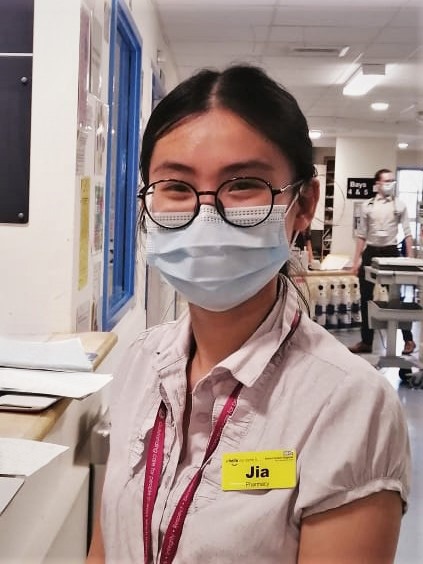
Additional information around medications has led to a huge rise in hospital pharmacists using the DCR – three of the top eight users at Dorset County Hospital can be found at the Dorchester-based pharmacy.
Jiapei Ong became interested in pharmacy while talking to her cousin, a pharmacist in Malaysia. She liked the way pharmacists worked with patients to improve their care. Jiapei then studied at Nottingham University, ahead of a pre-registration community pharmacy stint around Scunthorpe in North Lincolnshire.
Jiapei moved to Dorset County Hospital last summer and is one of 20-30 pharmacists, working with patients in the wards and providing cover in the dispensary.
She found out about the Dorset Care Record from an email at the start of the Covid-19 pandemic. Prior to completing her training, pharmacists at DCH primarily used the GP summary and Summary Care Record but Jiapei has found the DCR really useful.
“It depends what is uploaded on the Summary Care Record but generally you get more information in the Dorset Care Record. I like the medical history available on the DCR which allows me to check why the patient started on a particular medication. The DCR also contains any past medical conditions which may not be covered in the medical notes.
“We can check medication issues (how often patients collect their medications from GPs) and get an idea about medicine adherence before getting to speak to patients, which helps us to structure our consultation with them.”
She added that community pharmacists could also benefit from the DCR: “The blood results that have been booked by GPs can be viewed through DCR and allow the community pharmacist to look at the bigger picture when providing care to patients.
“It will be really helpful for them, especially at the weekends when a patient has, for example, forgotten his tablets. The pharmacist will be able to see additional information through the DCR and will then be able to exercise their professional judgement and provide emergency supply in critical situations such as epileptic medication or insulin for diabetes,
“The community pharmacist will be able to see the medications and past conditions which will really help with the review of the patient.
“Patients often come in and ask for more information about their medications but don’t know the exact name or the dosage and having access to the DCR solves this issue.”
With most of the nine rotational pharmacists at DCH now using the DCR, Jiapei feels the system is providing more detailed patient information and therefore enhancing patient safety.
Ends


